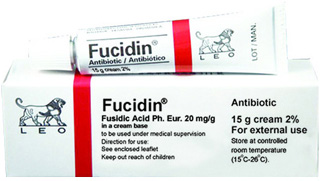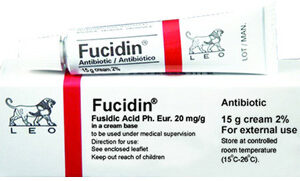Fucidin Medication Overview
Fucidin is an antibiotic medication primarily used for treating skin infections. Its active ingredient, fusidic acid, effectively targets Staphylococcus aureus, including methicillin-resistant strains (MRSA). Fucidin comes in several forms, including cream, ointment, and tablets. The route of administration is determined by the severity and location of the infection.
Pharmacological Properties
Fusidic acid, the active component of Fucidin, inhibits bacterial protein synthesis by preventing the turnover of elongation factor G (EF-G) from the ribosome. This action is bacteriostatic at low concentrations and bactericidal at high concentrations.
Dosage Forms and Strengths
Fucidin is available as a 2% cream or ointment for topical application and as tablets or suspension for oral use. The topical form is commonly applied two or three times daily. Tablets come in 250 mg and 500 mg strengths, with the usual dose being 250 mg to 500 mg twice daily.
Indications for Use
Fucidin is indicated for skin infections such as impetigo, folliculitis, and sycosis barbae. It is also used for erythrasma and secondary skin infections such as infected wounds and infected dermatitis. Oral formulations are reserved for more severe infections or those which are unresponsive to topical therapy.
Proper Administration
Topical Fucidin should be applied gently to the affected area. Hands must be washed before and after application to prevent the spread of infection. If using oral formulations, they should be taken with food to enhance absorption. Tablets should be swallowed whole with water.
Drug Interactions
Fusidic acid can interact with statins, leading to an increased risk of myopathy and rhabdomyolysis. Caution is advised when co-administering Fucidin with drugs metabolized by cytochrome P450 3A4 due to potential increased serum levels and toxicity. Concomitant use with oral anticoagulants may enhance their effects.
Specific Population Use
In pregnant women, Fucidin should only be used if clearly needed and the benefits outweigh the risks. It is unknown if fusidic acid passes into breast milk; caution is advised. Adjustments in the elderly may be necessary due to renal function changes. In pediatric patients, safety and efficacy depend on the formulation and infection severity.
Adverse Reactions and Side Effects
Common side effects of Fucidin cream or ointment include local skin reactions such as irritation, redness, and rashes. Oral Fucidin may cause gastrointestinal disturbances like nausea, vomiting, and diarrhea. Liver function abnormalities have also been reported with systemic use.
Storage Conditions
Fucidin cream and ointment should be stored at room temperature, away from light and moisture. Oral formulations must also be stored according to manufacturer guidelines, with attention to avoiding excessive heat and ensuring the integrity of the packaging.
Special Handling Instructions
Fucidin cream and ointment containers should be kept closed when not in use. Oral formulations should not be handled excessively, and any unused or expired medication should be disposed of appropriately to avoid accidental ingestion or misuse.
Pharmaceutical Incompatibilities
There are no widely recognized incompatibilities with topical Fucidin when used alone. However, it should not be mixed with other topical preparations on the same site without medical advice. For systemic therapy, pharmacists should review the patient’s medication profile for potential incompatibilities.
Monitoring Parameters
When using Fucidin, monitoring for signs of clinical improvement is necessary to evaluate the effectiveness of treatment. For systemic use, liver function tests may be warranted, especially with prolonged therapy or in patients with pre-existing liver conditions.
Overdose Management
In case of overdose with topical forms of Fucidin, local adverse effects may be more pronounced but systemic toxicity is unlikely. Oral overdose should be managed symptomatically, with special attention to hepatic function. There is no specific antidote for fusidic acid overdose, and hemodialysis is not effective due to its high protein binding.







Reviews
There are no reviews yet.